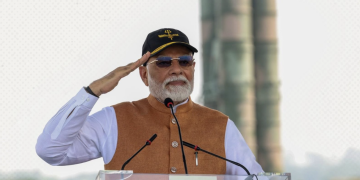Dear Editor
At the Belem (Brazil) COP 30 Climate summit, President Ali on November 7 stated, “Call to leave oil in the ground is (a form of) protectionism”, adding, “without practical financial assistance, developing countries have no choice but to rely on fossil energy (oil and gas) to fund their development”. He is spot on. Champions against climate change are concerned over rising global temperature that is heating up the world leading to rising ocean and seas threatening coastlines and low lying territories like Guyana. Advocates for reduction of fossil use have argued, with justification, that rising carbon emissions are a direct result of burning fossils and for global warming. But why should the poor countries carry the bulk of the burden of reducing their emissions while the developed countries increase theirs? Why should Guyana and other poor countries make the sacrifice? Leaving the fossil fuel in the ground should not even be an argument; it is a non-issue. Guyana and other poor countries have a God given right to use their natural resources for their development. And at any rate, there has not been significant just mitigation action by the developed world to aid poor countries as an incentive to leave the fossil energy in the ground. The President is right to resist calls to reduce oil production. It is ultra-nationalism and ultra-protectionism to leave the oil on the ground. Why should Guyana or any Guyana not want multinationals to come and develop oil fields and produce oil and gas? Guyana has been benefiting enormously from Exxon’s investment in oil blocks and production of oil and gas. To not allow Exxon and other oil giants to produce Guyana’s oil is a form of protectionism and nationalism for which there is no place in today’s globalized world.
Those of us who study economics understand ‘protectionism’ as a reference to international trade policies that ‘protect’ local industries by restricting imports (through various measures including what President Trump is doing by imposing astronomically high tariffs to deter consumption of foreign products). Trade protectionist policies are intended to favor local industries and businesses, but in most cases (including in USA) don’t benefit consumers; they have been found to largely benefit manufacturers or producers and sellers. Similarly, as President Ali, leaving the fuel in the ground protects the rich nations against the poor. It also protects the developed countries against the developing countries, the haves against the have nots, those who can manage without fossil against those who don’t have alternatives.
 As studies found, some two thirds of fossil fuel is owned and being produced in territories considered as developing countries (those of middle and low income); they critically depend on the fossil fuel revenues for development without which their economies would be stagnant as was the case with Guyana prior to the production of oil in 2018. The developed countries have reached their present status or stage of (over or post) development largely from the production and or use of fossil fuel to propel their industrialization; their extremely high standard of living is closely tied to fossil fuel and they are not quickly switching over to other forms of energy production. Developing or Third World countries critically need the revenues from fossil fuel to fund their basic (infrastructural) development; they have remained persistently poor because of lack of or inability to develop their fossil fuel. They depend on the multinationals of the developed countries to explore and develop their natural resources (like fossil fuel). Imploring or lecturing developing countries (like Guyana) in discussions at Belem, Brazil, for the COP 30 to leave the fossil fuel in the ground is a form of protection for the wealthy countries of the developed world. It is to stymie further development of the poor or developing or Third World countries like Guyana.
As studies found, some two thirds of fossil fuel is owned and being produced in territories considered as developing countries (those of middle and low income); they critically depend on the fossil fuel revenues for development without which their economies would be stagnant as was the case with Guyana prior to the production of oil in 2018. The developed countries have reached their present status or stage of (over or post) development largely from the production and or use of fossil fuel to propel their industrialization; their extremely high standard of living is closely tied to fossil fuel and they are not quickly switching over to other forms of energy production. Developing or Third World countries critically need the revenues from fossil fuel to fund their basic (infrastructural) development; they have remained persistently poor because of lack of or inability to develop their fossil fuel. They depend on the multinationals of the developed countries to explore and develop their natural resources (like fossil fuel). Imploring or lecturing developing countries (like Guyana) in discussions at Belem, Brazil, for the COP 30 to leave the fossil fuel in the ground is a form of protection for the wealthy countries of the developed world. It is to stymie further development of the poor or developing or Third World countries like Guyana.
At any rate, the developed countries (in Europe and North America) are expanding, not reducing, production of oil and gas as demand for energy is rising. The demand for fossil energy remains high, especially in developing countries (as China and India and other countries seek development status similar to Europe and North America), as alternatives (solar, wind, thermal, hydro, and others) are not cheap and easy to develop. Poor countries cannot afford and lack capacity to easily switch to alternatives. India, China, Turkey, Middle East, Latin and African countries rely on fossil for their energy to run machines to churn out needed goods.
Guyana, more than ever, relies on the production of fossil fuel for revenues to fund national development. Without Exxon’s investment (tens of billions in USA dollars since 2015) in exploring and producing oil (and soon gas for electricity production), and the large amounts of revenues accrued from sales and shared with Guyana, several billions in American dollars) accrued from 2019, Guyana would have remained a regular backwater country, largely unknown to the rest of the globe. Since 2020, the country is globally recognized for its rapid development and progress in infrastructure. It has persistently been in the news on development and energy production. The revenues from fossil fuel have helped to fund so many social programs (pension, NIS, social security, upliftment of women, sports, business grants, etc.), and education and health care.
Besides economic reasons for not curtailing fossil production, there is also political factor at play. Politicians have to respond to political pressure of constituents who increasingly demand better livelihood or else politicians lose their jobs. If oil is left in the ground, standard of living declines. Jobs would be lost and income falls; unemployment will increase and standard of living declined. And then there is the legal obstacle of leaving oil in the ground – Exxon and other companies signed an agreement to explore and develop oil. They spent billions of dollars to produce oil and gas. Guyana and other countries cannot break an agreement. How will MNCs like Exxon be compensated if the agreement is violated with the oil remaining in the ground?
So President Ali is right that without the proper financial mechanism (generous support) in place to assist developing countries with large deposits of fossil fuel that are being produced and compensation to oil companies, they have no choice but continue production (and use) of fossil energy.
Yours truly,
Dr. Vishnu Bisram



































































